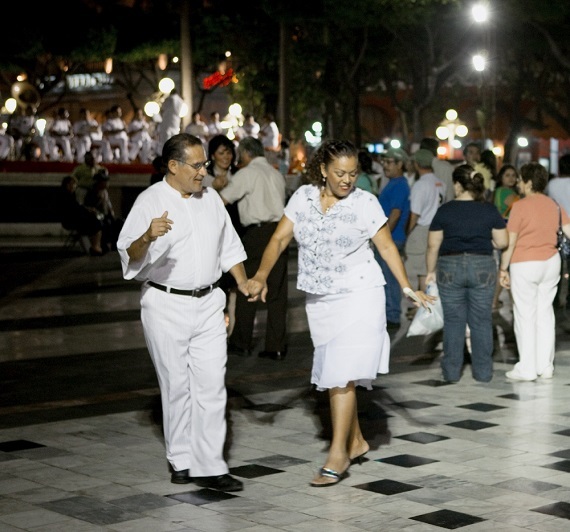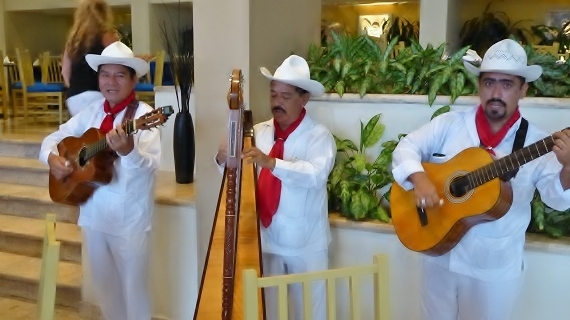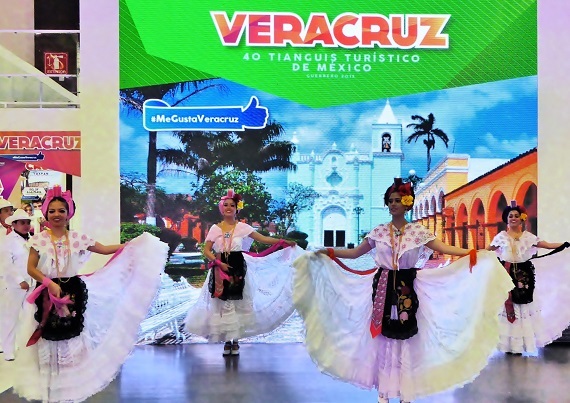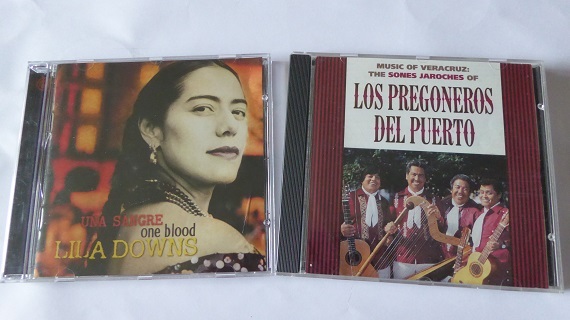Take a centuries-old Mexican folk song (perhaps rooted in Africa), pep it up with a rock beat, cut a chart-topping recording of it by a teen idol up in the States, then feature it in a hit movie, and you've got what worldwide fans know as La Bamba.
Back in Mexico you hear it at weddings, parties, bar mitzvas and at all kinds of fiestas. So what if the song's oft-changed lyrics over the years roughly translate to a kind of gibberish, or something going "higher and higher," and that you need "a little grace" to do the dance.

Couple dances to La Bamba in the town square of Veracruz. Photo courtesy of the Mexico Tourism Board.
Foreigners -- who've heard it over and over in everything from Richie Valens' bio flick to rock concerts by Bruce Springsteen -- sing along when the song's arguably best-known words come up: Yo no soy marinero, yo no soy marinero, soy capitan, soy capitan. (Translated, "I am not a sailor, I am not a sailor, I am a captain, I am a captain."
What does being a captain have to do with the rest of the song? "Not much, if anything," says Mexico historian Jaime Capulli. "It's possible it meant something to the guy who wrote (the song) hundreds of years ago -- whoever that was -- or maybe someone slipped those words in later on."
The beat of Valens' La Bamba, the words and even the instruments on the recording are all a far cry from what you'll hear down on the Gulf of Mexico's coastal town of Veracruz, where the local folks claim the song as their own (and have been known to cringe when they hear Valens' version).

Harp sets the beat for a jorocho band. Photo by Bob Schulman.
Down there, La Bamba is typically plucked out on a distinctive gut-string harp backed by three or so guitars played by local son jorocho bands. North of the border, most gringoes first heard the song on Valens' harp-less 1958 hit recording. It popped up again in the 1987 movie about Valens (played by Lou Diamond Phillips), who died in a plane crash in 1959, along with two other rockers, Buddy Holly and J.P. "The Big Bopper" Richardson.
Many -- but not all -- Latino musicologists agree the name of the song relates to the Spanish word bambolear, roughly meaning "to shake." Beyond that, though, the oft-improvised lyrics run the gamut from a happy Mexican dance tune to tales of lamented love. A version from Lila Downs' One Blood album comes pretty close to the authentic jorocho style, harp and all.
Valens, who reportedly didn't speak Spanish, got his version from his aunt and learned to sing it phonetically. Another rendering of the song -- among hundreds, perhaps thousands -- comes from a popular jorocho band called "Los Pregoneros del Puerto." Its twist on the sailor-captain line translates to "I am not a sailor, but for you I will be."
Los Pregoneros goes on to tell the story of a guy who loved and lost, and who turned up being anything but happy at his ex-girlfriend's wedding. The lyrics end this way: "Oh I ask you out of compassion, that La Bamba end and another song start."

Veracruz dancers at Mexico's annual Tianguis travel trade show. Photo by Bob Schulman.
Yes, there's a spicy version, too. Lots of them, actually. One is about a guy telling how his "bird" (a popular Mexican euphemism for a penis) flew away to a small village after the wedding -- possibly meaning he'll never make love again.
Could La Bamba have come from Africa? Still another theory of the song's origin traces it to the MBamba people living along the Bamba River in Angola and Congo in southwest Africa.
La Bamba, this theory says, started out as a work song of slaves from this area who wound up on plantations around Veracruz.
Getting back to those iconic sailor-captain lines in the modern-day song, ask folks living in Veracruz what they mean. The answer you'll most often get is, quien sabe ("who knows").
Our 2024 Coverage Needs You
It's Another Trump-Biden Showdown — And We Need Your Help
The Future Of Democracy Is At Stake
Our 2024 Coverage Needs You
Your Loyalty Means The World To Us
As Americans head to the polls in 2024, the very future of our country is at stake. At HuffPost, we believe that a free press is critical to creating well-informed voters. That's why our journalism is free for everyone, even though other newsrooms retreat behind expensive paywalls.
Our journalists will continue to cover the twists and turns during this historic presidential election. With your help, we'll bring you hard-hitting investigations, well-researched analysis and timely takes you can't find elsewhere. Reporting in this current political climate is a responsibility we do not take lightly, and we thank you for your support.
Contribute as little as $2 to keep our news free for all.
Can't afford to donate? Support HuffPost by creating a free account and log in while you read.
The 2024 election is heating up, and women's rights, health care, voting rights, and the very future of democracy are all at stake. Donald Trump will face Joe Biden in the most consequential vote of our time. And HuffPost will be there, covering every twist and turn. America's future hangs in the balance. Would you consider contributing to support our journalism and keep it free for all during this critical season?
HuffPost believes news should be accessible to everyone, regardless of their ability to pay for it. We rely on readers like you to help fund our work. Any contribution you can make — even as little as $2 — goes directly toward supporting the impactful journalism that we will continue to produce this year. Thank you for being part of our story.
Can't afford to donate? Support HuffPost by creating a free account and log in while you read.
It's official: Donald Trump will face Joe Biden this fall in the presidential election. As we face the most consequential presidential election of our time, HuffPost is committed to bringing you up-to-date, accurate news about the 2024 race. While other outlets have retreated behind paywalls, you can trust our news will stay free.
But we can't do it without your help. Reader funding is one of the key ways we support our newsroom. Would you consider making a donation to help fund our news during this critical time? Your contributions are vital to supporting a free press.
Contribute as little as $2 to keep our journalism free and accessible to all.
Can't afford to donate? Support HuffPost by creating a free account and log in while you read.
As Americans head to the polls in 2024, the very future of our country is at stake. At HuffPost, we believe that a free press is critical to creating well-informed voters. That's why our journalism is free for everyone, even though other newsrooms retreat behind expensive paywalls.
Our journalists will continue to cover the twists and turns during this historic presidential election. With your help, we'll bring you hard-hitting investigations, well-researched analysis and timely takes you can't find elsewhere. Reporting in this current political climate is a responsibility we do not take lightly, and we thank you for your support.
Contribute as little as $2 to keep our news free for all.
Can't afford to donate? Support HuffPost by creating a free account and log in while you read.
Dear HuffPost Reader
Thank you for your past contribution to HuffPost. We are sincerely grateful for readers like you who help us ensure that we can keep our journalism free for everyone.
The stakes are high this year, and our 2024 coverage could use continued support. Would you consider becoming a regular HuffPost contributor?
Dear HuffPost Reader
Thank you for your past contribution to HuffPost. We are sincerely grateful for readers like you who help us ensure that we can keep our journalism free for everyone.
The stakes are high this year, and our 2024 coverage could use continued support. If circumstances have changed since you last contributed, we hope you'll consider contributing to HuffPost once more.
Already contributed? Log in to hide these messages.



